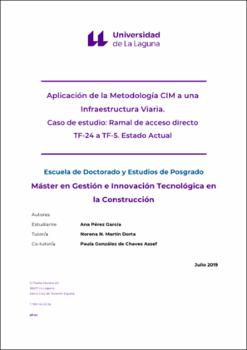Aplicación de la Metodología CIM a una Infraestructura Viaria. Caso de estudio: Ramal de acceso directo TF-24 a TF-5. Estado Actual
Autor
Pérez García, Ana
Fecha
2019Resumen
El presente estudio pretende elaborar un análisis en profundidad del Building
Information Modeling (BIM) en el ámbito de la Ingeniería Civil. Para gran parte del
sector de la construcción, la metodología BIM es aún un terreno inexplorado y
bastante desconocido. Tras llevar a cabo la labor de investigación del estado de la
técnica pertinente, se observa, además, que ésta se encuentra mucho más
desarrollada en el sector de la edificación que en el de la ingeniería civil.
El objetivo principal de este trabajo es elaborar el modelo de información de una
infraestructura viaria existente y de la obra proyectada. Por tanto, éste estará
dividido en dos: situación actual e intervención en la zona de proyecto. La
realización de ambos modelos permitirá disponer de una maqueta virtual y
anticipar las posibles incidencias en fase de proyecto o de "pre-construcción".
Tanto del proceso de modelado como del de exportación de archivos se identifican,
extraen y analizan los diferentes problemas encontrados. Se pretende trabajar con
los formatos de intercambio (esencialmente IFC) para observar la interoperabilidad
del modelo en diferentes visores BIM y comprobar si existe pérdida de la
información transferida.
El caso de estudio se sitúa en la isla de Tenerife, concretamente en la demarcación
de Padre Anchieta, localizada en el Término Municipal de San Cristóbal de La
Laguna. Este modelado incluye, además de la glorieta Padre Anchieta, diferentes
vías como la TF-24, la TF-263, la TF-5, la Calle Las Mejoranas y la Rambla Las
Clavellinas. This study aims to develop an in-depth analysis of the Building Information
Modeling (BIM) in the field of Civil Engineering. For much of the construction sector,
the BIM methodology is still uncharted and quite unknown. After carrying out the
research work, it is found that it is much more developed in the building sector
than in civil engineering.
The main target of this work is to develop the information model of an existing road
infrastructure in which it is intended to carry out a modification of the layout.
Therefore, it will be divided into two different models: current situation and
intervention in the project area. The realization of both models will allow to have a
virtual model and anticipate possible incidents in the project phase or "preconstruction". From the processes of modeling and exporting files, the different
problems detected are identified, extracted and analyzed. It is intended to work
with the exchange formats (essentially IFC) to observe the interoperability of the
model in different BIM viewers and check for loss of the transferred information.
The case studied is located on the island of Tenerife, specifically in the demarcation
of Padre Anchieta, located in the Municipal Term of San Cristóbal de La Laguna.
This modeling includes, apart from the Padre Anchieta roundabout, different
routes such as the TF-24, the TF-263, the TF-5, Calle Las Mejoranas and Rambla Las
Clavellinas.





